Politics
Earth Odyssey 2011
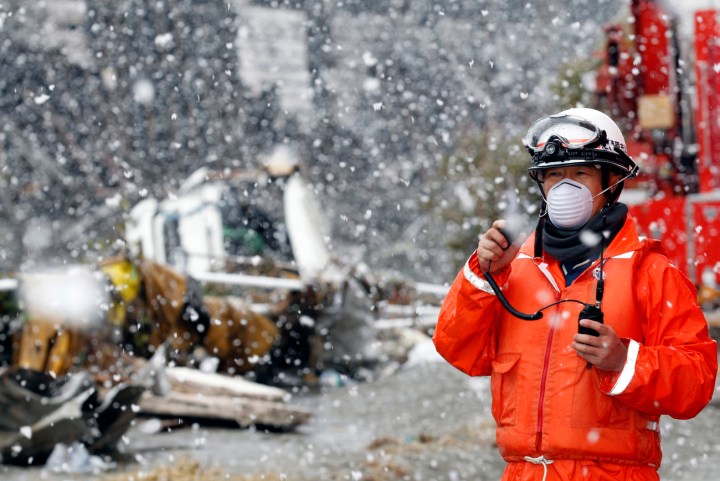
The year 2011 has yielded revolutionary – and evolutionary – changes that may well, taken together, be seen as a distinctive moment in history. J BROOKS SPECTOR looks back on the good, bad, ugly and truly extraordinary events of the past year.
On 24 October 1793, France adopted a new decimalised calendar as part of a thoroughgoing discard of everything that could be a reminder of the “Ancien Régime”. And just to make their point absolutely clear, they backdated the beginning – year one – to 1789, the year of revolution. A half a millennium earlier, when the Islamic religious revolution came whirling out of the Arabian Desert, besides carrying its new world view, one of the things Allah’s warriors also brought along was a new calendar and a new start date to begin the counting of the world.
One wonders, whether humankind will ever again pick a new nodal starting point – a kind of fundamental before and after moment – for marking off the days, months and years of human existence; a measuring rod to divide things between the darkness before enlightenment and then the light thereinafter. (Of course, “Star Trek” franchise devotees already know this will happen once that warp drive is invented. When that happens, it will just a hop, skip and a jump until we begin to use “star dates”, but we still must wait for that just a while longer.)
Aside from calendar reforms to hammer home the point of division, there have been other crucial moments in human history that parse between a clear before and after. A fair question, then, is whether in the years and decades to come, will we remember 2011 in quite the same way as history books now note the years: AD 476, 1492, 1776/1789, 1848, 1905, 1917, 1945 and 1990?
Can a case be made for the year we have now just about lived through? The year 476 of course was the final whimper and death rattle of the increasingly enfeebled West Roman Empire; 1492 was the first Columbian voyage to the Western Hemisphere, the conquest of Moslem Granada and the expulsion of Jews and Moslems from Christian Spain; 1776/1789 were the twinned American and French Revolutions; 1848 was the year of revolution throughout Europe; 1905 brought Einstein’s theory of special relativity to upset all those known knowns; 1917 offered a Communist victory in Russia; 1945 the end of World War II and the dawn of the atomic age; and, finally, 1990 was the year of the collapse of socialism and the Cold War system. All were clearly hinge moments, according to political analysts and historians. And 2011? 2011 has yielded revolutionary – and evolutionary – changes that may well, taken together, be seen as a distinctive moment in history – and so here is a case for that very determination.
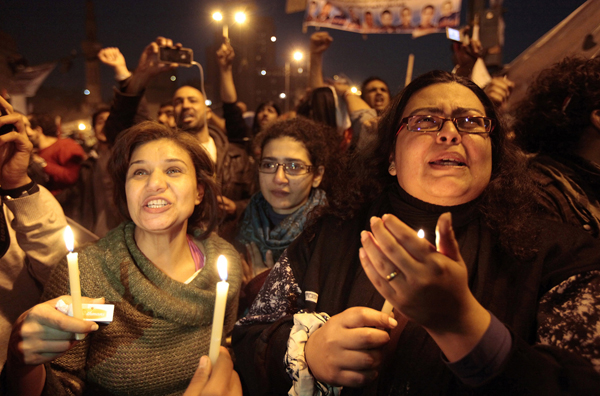
Anti-government protesters celebrate inside Tahrir Square after the announcement of Egyptian President Hosni Mubarak’s resignation in Cairo February 11, 2011.REUTERS/Dylan Martinez
Until the beginning of 2011, much of the Arab world existed in a kind of suspended animation since its decolonisation began in the wake of the collapse of the Ottoman Empire. Kings eventually gave way to authoritarians – but virtually never did anything that could be called an open political system ever come to exist in place of the earlier arrangements.
Then that nearly-anonymous, Tunisian vegetable seller changed everything in Tunisia, Egypt, Libya, Syria, Yemen – and well beyond. Popular – and populist – uprisings are bringing into power new regimes across the Mahgreb, and threaten to do so in other states. The mass movement caught long-time local rulers totally by surprise – but they also confounded other governments as well. And it seems to have had a more profound impact in other parts of the world as well, even though the results so far are not quite what politicians in America, the UK, Paris or Moscow might have been hoping for to follow in the wake of the revolutions.
Then, in Iraq and Afghanistan, the Obama administration has continued to draw down American forces, along with allied forces; bringing to an end the high water mark of the mix of American triumphalism and unthinking revenge that was triggered by 9/11, but was carried out by the administration of George W Bush to rearrange the Middle Eastern map. It remains for 2012, however, to show how the hope for some sort of fragile stability in Afghanistan and Iraq – and more importantly, perhaps, in Pakistan – will play out, once American power is essentially gone from the area.
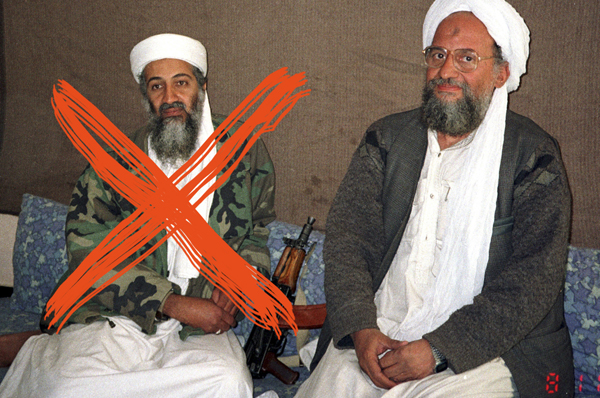
Osama bin Laden (L) sits with his adviser and purported successor Ayman al-Zawahri, during an interview with Pakistani journalist Hamid Mir (not pictured) in an image supplied by the respected Dawn newspaper November 10, 2001. REUTERS/Hamid Mir/Editor/Ausaf Newspaper
2011 may also have seen the high water mark of international terror activities, at least those directed led or inspired by Osama bin Laden. US military special forces found and killed him in his isolated Pakistani hideout (near to a Pakistani military academy) and then disposed of his body at sea. Irredentist grievances, of course, continue to exist around the world, and may well trigger other attacks by yet other groups, but OBL’s near -mythic stature – and his looming presence in the minds of some American politicians – has now melted away to a degree that seemed impossible only a year ago.
In Iran, a nation trying hard to achieve nuclear power status, that country’s efforts were thwarted so far by mysterious explosions at its missile test sites and the deaths of some of the country’s leading nuclear scientists. In addition, someone – or some government or governments – appears to have engineered the insertion of a truly killer software program, Stuxnet, into the computerised management of the centrifuges vital to isolate fissile materials from other isotopes for the production of nuclear devices. And all these developments in Iran happened as citizen opposition to the theocratic regime took to the streets in protest – even though that opposition failed to overthrow the theocratic Iranian state.
Israel, meanwhile, has been forced to confront a series of more substantial threats to its equanimity, first from the uncertain events of the Arab spring, then Iran’s presumed progress with missiles and nukes, the Palestinian push for broader recognition at the UN, and the unravelling of its tacit alliances with Egypt and Turkey. If there is a truly volatile uncertainty for the Middle East – and thus for the rest of us – it almost certainly is located right here.
Meanwhile, in Europe, the eurozone crisis of 2011 – evolving out of the sour international economic climate that some of its origins in the financial crisis of 2007 – has banished all those optimistic thoughts that underpinned the European unification project from the past two generations. Rather than an expansion across the map of Europe eastward, the fate of the 16-nation common currency is in flux, and the EU itself is split between the UK and the rest, and between the stronger economies and everybody else. At this point, the increasingly grim choice is between a much stronger fiscal and political union – or the gradual decay and even collapse of this post-World War II project. Next year should tell which path is chosen, but keep your currency holdings flexible.
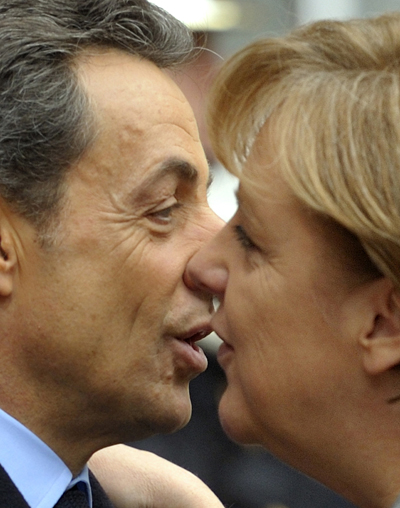
France’s President Nicolas Sarkozy (L) welcomes German Chancellor Angela Merkel at a meeting in the eastern French city of Strasbourg November 24, 2011. REUTERS/Philippe Wojazer
Events in Japan, more than Durban’s COP17 meeting, demonstrated the fragility of human control over the environment – and its frequent inability to contain the aftermath of entirely predictable disasters. The tsunami that struck the Tohoku coast was horrific, but as everyone who followed the news knows well, the waves flooded, then forced a shutdown of the Fukushima Dai-ichi nuclear power reactors. This led to food chain radioactive contamination; and the furore has now forced Japanese electric power generators to shut down virtually all the country’s nuclear powered electricity generating stations. In the process, this has given a huge push around the world to those who would roll back nuclear power in place of alternative energy sources, but also back to go back to old standbys of coal and natural gas fired plants as the best of a bad, polluting bargain.
Of course, there is still two weeks left in 2011 for scientists to hear messages from Kepler 22b or another Goldilocks Zone planet. If that happens, all the other events for this year are probably moot as humankind will pause to reflect upon what kind of an answer will make sense after 600 years of travel before it is received.
Staying with East Asia, the rise and rise of China is another key story that will not be put to rest. The impact of EU leaders travelling to or teleconferencing with Chinese economic and political leaders to seek help for the next bailout package is simply the most visible sign of the re-emergence of China as a major global economic power, in a way that has not been true for nearly five hundred years. Put that together with the reassertion of Chinese force projection via its big-shouldered patrols throughout the South China Sea region and its sea trials for a new (okay, renewed) aircraft carrier – even if this muscle is now being countered by India, the Asean nations as well as the US – and this is the core of the remaking of the global strategic landscape.
In the US, meanwhile, there was a growing realisation across the political landscape that the global economic stall has heightened – rather than held back – growing economic disparities between the top 1% and all the rest. In time, it will become clearer to see that the Tea Party and Occupy Wall Street phenomena were part of the same unease about the national economic bargain – and probably will become permanent parts of the national economic and political landscape, even if OWS has – temporarily – been tamped down and many of the Tea Partiers’ fondest ambitions may face defeat in 2012. If the American political party duopoly is broken up by something we will call the radical centre, we can mark 2011 as the year of its birth.
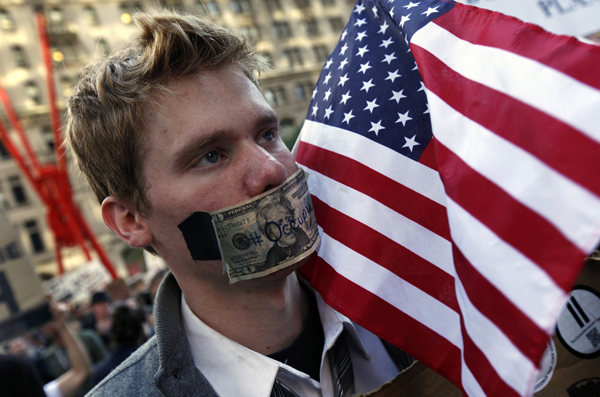
An Occupy Wall Street protester marches up Broadway in New York City, October 5, 2011. REUTERS/Mike Segar
In places as different as Myanmar/Burma and Russia, too, the new more-open global political climate pushed up tentative shoots. In Russia, Vladimir Putin’s bid to become president again at the head of his United Russia party – something that was supposed to be a cross between the “March on Rome” and a coronation – has now become much more troubled. Large demonstrations have opposed his return to the top in cities across Russia. And in the near-hermetically sealed nation of Burma, the military clique that has ruled the country since 1962 released its most famous dissident, Aung San Suu Kyi, from house arrest. And almost immediately, she began her move into the country’s political space, meeting secretary of state Hillary Clinton and announcing that she would run for a seat in Burma’s parliament in 2012.
But what some many of these political events have in common is that they demonstrated the combined effects of international all-news satellite and cable broadcasting, the Internet and social media to bring out crowds and kept them informed, engaged and motivated. They showed how these mixed media carried word back to supporters, other world leaders and audiences alike around the world – usually in virtually real time. The genie is out of the bottle now and almost certainly cannot be re-caged. Thus, the challenge for future governments is that the waves of social and political demands from such electronic herds cannot easily be managed, let alone acceded to without giving away the political power governments have held onto so far.
A year or so ago, this writer argued that the new power of forces like Wikileaks would only be fully realised once the leaders of corporations wake up to find their confidential correspondence available worldwide – or when North Korean nuclear designs are available for everyone to read on the Internet – as long as your Korean is good. While that last one hasn’t happened yet, the world has watched Facebook files of closed-door Chinese military briefings decrying leakage of state secrets by defecting Chinese military and civilian officials. Are North Korean secrets that far behind?

Tunisia’s President Zine al-Abidine Ben Ali talks with Qatar emir Sheikh Hamad bin Khalifa al-Thani, Algeria’s President Abdelaziz Bouteflika and Syria’s President Bashar al-Assad (front row, 2nd L-R) as he stands next to Libya’s leader Muammar Gaddafi (front row, L) as they pose for a family photograph at the Arab League summit in Sirte March 27, 2010. Arab League Secretary General Amr Moussa (back row, L) and Saudi Foreign Minister Prince Saud al-Faisal (back row, 2nd R) stand in the back row. REUTERS/Zohra Bensemra
Of course the world took final leave of many amazing, important, horrific people in 2011 – people who made us laugh, sing, cry, run for our lives or look up to the future with hope. Among these were Amy Winehouse, Osama bin Laden, Dobie Grey (the composer of “In Crowd” and “Drift Away”), Harry Morgan of MASH, British director Ken Russell, Lana Peters (perhaps better known once as Svetlana Stalina), Smokin’ Joe Frazier, TV’s resident cynic Andy Rooney, Muammar Gaddafi, Dennis Ritchie (a key figure in the creation of the “C” computer language and the UNIX operating system), Steve Jobs, US civil rights struggle veteran Fred Shuttlesworth, Kenyan environmentalist Wangari Maathai, the father of e-books Michael Stern Hart, song writer Jerry Leiber, painter Lucian Freud, uncompromising Russian civil rights campaigner (and Andrei Sakharov’s wife) Yelena Bonner and Clarence Clemons of the E Street Band. DM
For more, consider:
- A sneak peek at what some good minds think about for 2012 in “The World in 2012”, in the Economist.
- Most other newspapers and weekly magazines are due out with their predictions and retrospectives over the next two weeks. However, The Daily Maverick has already offered a précis of 2012’s upcoming elections in “Mayans may not be quite right, but 2012 will still be special”.
Main photo: A rescue worker uses a two-way radio transceiver during heavy snowfall at a factory area devastated by an earthquake and tsunami in Sendai, northern Japan March 16, 2011. REUTERS/Kim Kyung-Hoon





 Become an Insider
Become an Insider